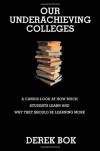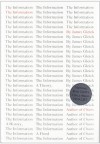Currently reading
McGlue
Knife Fight and Other Struggles
Far from the Tree: Parents, Children, and the Search for Identity
The Good Lord Bird
Ancillary Justice
Our Underachieving Colleges: A Candid Look at How Much Students Learn and Why They Should Be Learning More (New Edition)
Dissident Gardens
Nightmare Movies: Horror on Screen Since the 1960s
The Information: A History, a Theory, a Flood
Complete Novels
Conversations with Scorsese
 This book was pure pleasure, and I picked through it over a few anxious nights after a few grim days at work. You know those kinds of nights? So much residual aggravation flooding through the system that concentration on any novel or conversation or activity ends up in mental noodling, the mind drifting back over the bad day, suddenly returning to the page to realize you have no idea what happened over the last sixteen paragraphs, or what your partner just said to you. I seemed only good for the occasional jog, running at a pace far faster than I normally would (or really should), my earbuds blasting orchestral anthemic indie rock as a form of counter-neural-programming, trying to flood the system with endorphins and Portugal. The Man.
This book was pure pleasure, and I picked through it over a few anxious nights after a few grim days at work. You know those kinds of nights? So much residual aggravation flooding through the system that concentration on any novel or conversation or activity ends up in mental noodling, the mind drifting back over the bad day, suddenly returning to the page to realize you have no idea what happened over the last sixteen paragraphs, or what your partner just said to you. I seemed only good for the occasional jog, running at a pace far faster than I normally would (or really should), my earbuds blasting orchestral anthemic indie rock as a form of counter-neural-programming, trying to flood the system with endorphins and Portugal. The Man.But eavesdropping on Scorsese and Schickel--this book transcribes a series of conversations, loosely arranged in a chronology marking each of "Marty's" films--sent me into reverie. They'd pursue a line of thinking about one or another of his flicks--a simple question about what happened during production, why a particular shot caused such consternation--and then they'd slide off the mark, into obsessive digressions about one of the eighteen thousand films they've each seen, and suddenly I was transported, slipping away from what had seemed central, lost in the passions of fanatic love not just for "the form" but for the way film is woven into every aspect of their lives--and mine! a central escape that returns me to my inmost self and its trippy strangeness, my weird loves, my termite infatuations with detail.
Ironically, feeling trapped and overwhelmed in my daily life, I have a peculiar fondness for works of anxious entrapment, where the plot is on a steady march toward the inescapable. Horror films where, ultimately, the zombie hordes are going to push through the barricades; a variety of noirs where, in the end, the solution of the mystery simply returns the detective to his haunts, the social order untouched by the revelation of its base corruption; conspiracy thrillers where, when Warren Beatty finally tracks every stray thread back into the shadows, the investigator is swallowed up in the Plot, realizing that he, too, is a pawn in its inevitable conclusion. I don't enjoy these at arm's length, abstractly, nor do I seek some easy freudian mastery or distancing, "rehearsing" my own fears, and then happily pushing them down. Nope. I break into a broad grin when the plot pivots, revealing the false escape, the failure of control.
I say all this to dig into my favorite of Scorsese's films, what in conversation here is called a "minor work"--After Hours. For a good ten-year stretch, I was obsessed with two films, each of which I must have seen 25, 30 times. After Hours is an account of young urban professional Paul (Griffin Dunne), bored at work, heading out early one evening to grab a coffee and happening upon a woman (Rosanna Arquette) who gob smacks him. He gets her number, and on a whim heads to Soho for an impromptu date. And things go south. The surreal particulars of his entrapment are not worth spoiling--a lost $20, a furious cabbie, a series of burglaries, an ice cream truck, an angry mob, and a series of papier-mâché bagels. It ends with Peggy Lee--Is that all there is?--and a perfect circular return to the beginning. As narrative, it is an elaborate clockwork device, where strange side details emerge as if to pull the film off track, only later to be woven back into the central arc, another chain around Paul's neck, another anchor, one more trap sprung.
I have trouble capturing the tone of the film. Its details can seem whimsical, but it's shot in High Dread, and Scorsese notes in conversations here how he sought to amplify, if not parodically exaggerate, a Hitchcockian mode. (I once described it to a friend as akin to that feeling when you're leaning back on a chair, letting it tip, when suddenly you lose control, and your hands shoot forward trying to grab something, anything, that moment of panic right before you either push forward or resign yourself to the fall. She laughed, and then saw the film with me. Walking out, she had a headache, a knot in her shoulders, and was up for hours afterward. I was grinning like a fiend.) The film is full of little soliloquies, characters opening up to Paul, his face slowly tracking the movement from empathetic interest to confusion to nervous, even frightened darting-eye worry as their stories track from an understandable human emotion to some crazed exploration of a hideous event or obsession. Everyone's a nut--even Paul, who eventually has his own soliloquy, ranting at a man who himself was only hoping for a little romance with P, who finds himself listening to an increasingly rabid Paul, slouching further and further down on his sofa.
There might be something about the wedding of a "minor film" to one's own obsessions which can produce such passionate thrall. Everything I love about Scorsese is most perfectly realized for me in this film--a poet of the visceral potential of film: expressionist editing, a perfect understanding of the impact of the soundtrack, a black and bleak but compassionate understanding of the insanity of human emotions and behaviors.
I said two films. The other obsession was Capra's It's a Wonderful Life, and for a long while these two films seemed like yin and yang, revelations of two sides of my own personality: softer, hopeful, embracing the import of community and compassion -- or cold, snarling, snickering about the impossibility of real understanding and communication. But it is worth noting that Life, too, is about entrapment. George Bailey's desires to leave small-town Bedford Falls never pan out--a dying father, an obligation to the family business, a bank run, a family of his own. He's stuck scrambling for some small measure of economic freedom against the spidery businessman Potter. Even his suicide is interrupted--the angel "saving" him revealing a world so bleak without G. Bailey that George returns. And, sure: the return is joyous--there's no getting around the film's final celebratory tone, which is infectiously moving, George delighted to return to all that anchors him. But what most people remember is an alleged schmaltz, where what I recall most vividly is Jimmy Stewart's wild eyes:

George Bailey, Paul Hackett.













